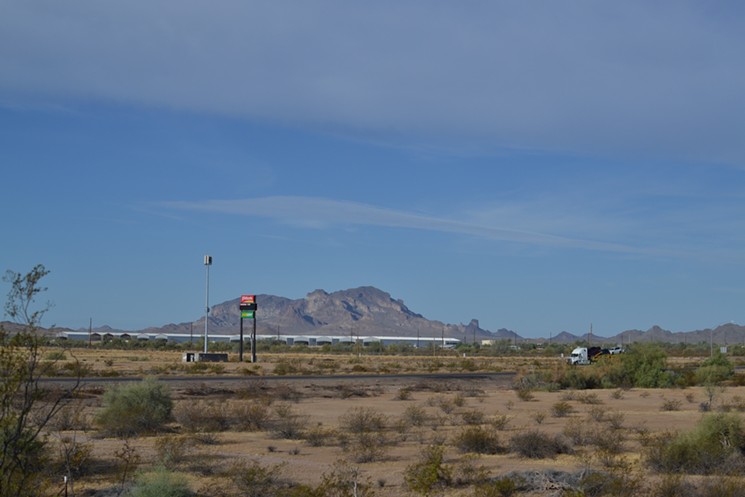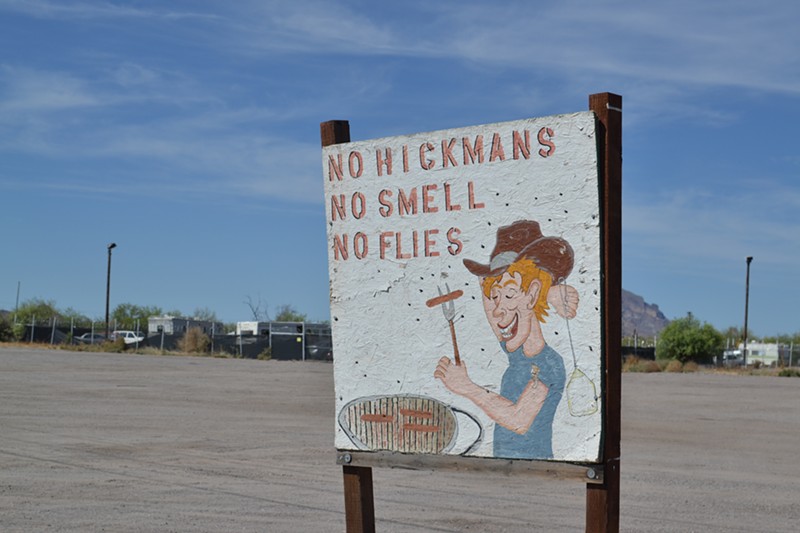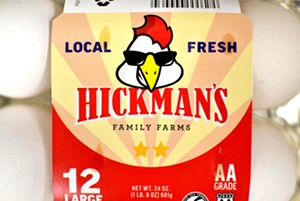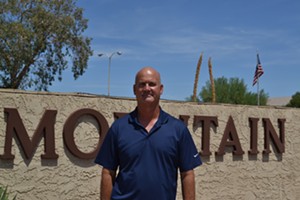Dan, who worked at the Palo Verde Nuclear Generating Plant, and June, a third-grade teacher, raised their four children in that house. They planned to live out their retirement there, in Tonopah, where they moved from Mesa in 1978.
They loved the quiet that came with being 50 miles west of Phoenix, and they took the rigors of rural living, like living off of groundwater, in stride. Over the years, Dan cultivated an irrigated desert landscape in the slopes alongside the house. Nearby farms had expanses of cotton and corn. Their property abutted untouched federal land. Before they retired, Palo Verde was a 15-minute commute for Dan. For June, school was 12 miles away.
Over the past five years, though, the Blacksons' circumstances have changed. Their adult children and eight grandchildren visit less and less. They are thinking of selling their home, uncertain how much longer they can — or want to — stay.
The problem began in 2014, with the arrival of a factory owned by the biggest egg producer in Arizona: Hickman’s Family Farms.

Hickman's chose Tonopah for its proximity to Interstate 10, vice president Billy Hickman has said.
Elizabeth Whitman
Since then, Maricopa County has granted air quality permits to the egg factory, and the state Department of Environmental Quality has declared that the egg factory in Tonopah presented “no apparent immediate health concern.” In April 2017, at residents' requests, the federal Agency for Toxic Substances and Disease Registry began probing, using ADEQ data, whether the hydrogen sulfide and ammonia emissions from the factory were dangerous to people. Two-and-a-half years later, the agency is still investigating and "evaluating the data received," according to a spokesperson.
Locals were disgusted from the beginning. They took videos of the dirt and tiny feathers that filled the air, and aerial footage of the barns. They documented chicken guts spilled from rumbling semis traveling too fast on local roads. At Saddle Mountain RV Park, about a mile from Hickman's, an employee spent an hour every morning skimming the film of feathers and dander from the community pool. Flies — gobs and gobs of them — infiltrated homes. Despite regulators' claims of "no apparent immediate health concern," they didn't see how the stink they inhaled wasn't toxic.
As Tonopah became increasingly unlivable, some tried to band together and resist.
In 2014, Linda Butler, a Tonopah resident, organized a boycott of Hickman’s eggs, handing out fliers to shoppers in local Fry’s stores and Walmarts for about a year. She and others founded a group opposing the egg factory, called Save Tonopah Oppose Poultry Plant, or STOPP; Dan Blackson is a member.
In 2017, more than a dozen people, including the Blacksons and Butler, along with Tonopah businesses like Saddle Mountain RV Park, filed nuisance lawsuits, alleging that Hickman’s had deprived them of the right to enjoy their property — cases that are still wending their way toward trial, and that prompted Hickman’s to countersue. Two filmmakers, Matt Wechsler and Annie Speicher, even interviewed residents for a documentary, Right to Harm, about the public health impacts of concentrated animal feeding operations, or CAFOs. Tonopah was one of five communities across the U.S. that it featured.
Coverage of a local screening of the documentary caused Hickman's CFO, Jim Manos, to take to the pages of the local West Valley View newspaper to declare that negative claims about Hickman's were exaggerated, and that because the area was zoned for agricultural use, locals who lived there had given their implicit consent to Hickman's presence.
Manos did not respond to an emailed list of detailed questions from Phoenix New Times for this piece, although a read receipt indicated he read a follow-up text message asking about a response to those questions. In a previous interview, in September, when asked for comment about the nuisance lawsuits, he responded that he didn't know what the comment would be.
Still, the trucks carrying delicate shelled cargo continue to pull out from behind the Hickman’s barns, which house more than 3 million laying hens, according to court documents. The nuisance lawsuits drag on, with the nearest trial at least a year away.
For some, all of it — a stink so pungent it makes the eyes water, the flies, the activism that failed to catch, the nagging sense that regulators favor Hickman’s over Tonopah residents — is too much. For them, the time has come to abandon Tonopah, a community whose slow death began when Hickman’s came to town.
Movin’ Out: the RV Park
Cheryl Reese and her husband, Dale, spent their first season at Saddle Mountain RV Park the year before Hickman’s arrived.They parked their RV there in the winter, working in exchange for rent. Last year, they decided to stay year-round, becoming full-time managers and moving into the old firehouse across the street. They loved the community, which felt like an extended family, and the spacious lots, Cheryl Reese said, even as the stink from the chickens slowly began driving longtime visitors and residents away.
At the end of this summer, Mike Wirth, who co-owns Saddle Mountain RV Park with his brother, decided to close the business sometime in spring 2020. Wirth said he couldn’t justify the expense of running it, with fewer and fewer residents and guests because of all the complaints about the effects of the nearby egg factory.
“The smell and flies ruined it for us,” one guest wrote in July 2018 on CampgroundReviews.com. “Sure hope they can fix it.”
“We’ve done everything we can,” said Wirth, who remains embroiled in the nuisance lawsuits against Hickman’s. “The bottom line is, we can’t function.”
In Wirth’s view, the smell and the flies from Hickman’s are not just forcing him to shutter his business. They are forcing him to tell the people who live or stay at the RV park that they’ll just have to find somewhere else to go.
As she sat in an armchair in the park’s main building, talking about how the park’s closure would affect her, Reese broke down.
“I’m going to really hate it when it closes,” Reese said, choking up. She pressed a tissue to her eyes and apologized, saying it was the first time she had fully contemplated the park’s closure. No official end date has been set, and she and Dale agreed to stay on and help Wirth through the very end, she said. They haven’t decided yet where they’ll go.
The RV park has 342 sites. Those who stay are a mix of year-round permanent residents, snowbirds, and short-term guests, and the majority of the residents are seniors, with some in their 50s and 60s. A few longtime residents are in their 70s, said Reese, who is 68. About 20 people stay year-round.
On a day in late September, the park had 58 RVs — about 120 people, Reese estimated.
“I feel really bad for a lot of the residents,” Reese said. “I don’t know what some of the people will do. They’ll find something, I’m sure,” she mused.
Brian Richardson, 72 and in his seventh season as one of the park’s snowbirds, said he did not know where he would go once the park closed. “Maybe I’ll just stay here anyway,” he joked, before growing serious.

Brian Richardson said the Saddle Mountain RV Park, where he spends winters, is "home."
Elizabeth Whitman
“I just don’t know how to respond,” he said. “This is home.”
As the RV park loses visitors, other businesses are affected, too.
Oscar Lopez, who owns a body shop and the restaurant Oscar’s Place Y Cantina just off the interstate, said that the number of local diners has declined as business at the RV park dried up.
On Yelp, diners from out of town took note, too.
“There are a lot of flies, but I don’t know that it can be helped because there seem to be a lot of flies outside in this area in general,” wrote one woman from Texas in March 2017.
“Lots of flies,” noted another from Tucson in February, who allowed that the food “was really good!”
More recently, a Californian was less charitable.
“Stay the hell away away from oscars place y cantina,” said the one-star review from July. “Too many damn flies flying over my food and flying all inside this establishment.”
It complained about the service and prices before concluding, “this place needs to shut down. the outside has a bad odor.”
No Longer a Forever Home: the Blacksons
Most mornings and evenings, the Blacksons can step out of their back door to see a brown haze settling to the east of Hickman’s barns. To the west is the intake side of the walls of industrial fans that blow air over manure in the hen houses to dry them out, the recycled air flowing out to the east, toward town and the RV park.The stench differs from day to day, and it can appear in an instant, they said one morning in late August over coffee in their kitchen. They know the telltale signs of its arrival, even before it hits them.
“You can be outside, and suddenly, your eyes start to water,” June said. “You know it’s coming ‘cause your nose starts running.”

The white tops of the Hickman's barns, center, are visible from Dan and June Blackson's driveway.
Elizabeth Whitman
“The laws are really not in favor of the citizen,” Dan said. “I think part of the frustration is getting people to really understand the situation and for the community to really have an effective voice.”
Dan said he couldn’t gauge how strongly the rural community felt about Hickman’s, but June described a sense of powerlessness.
Some STOPP meetings draw a crowd, while others are sparsely attended. People don’t think the group can do any good, she said. “We don’t think that Hickman’s will ever go away,” she said, in a quiet allusion to her own resignation.
A major problem for those in Tonopah fighting Hickman’s is the community's unincorporated status. Its sole local elected representative sits on the Maricopa County Board of Supervisors, and his name happens to be Clint Hickman, who is the VP of sales and marketing at — you guessed it — Hickman’s Family Farms. He was appointed in 2013, the year before Hickman’s began building its factory in Tonopah, and was re-elected in 2016.
This fact has nothing to do with the company, according to its president and CEO, Glenn Hickman. As he told the citizens of Tonopah during a January 2014 neighborhood meeting, Maricopa County had “no authority to regulate this agricultural business.” Clint wasn't attending that meeting, precisely to avoid any “perceived conflict of interest,” Glenn Hickman said, according to a transcript.
But the power of Clint Hickman’s seat on the county board, which oversees divisions like the county Air Quality Department, which issues permits to Hickman’s, is not lost on the Tonopah residents, who question whether anyone in local government is, or can be, on their side.
“Fighting against the system is really difficult,” Dan Blackson said. For the past five years, it’s been hard not to yield to the idea that Hickman’s is here for good, he said. For now, he refuses to give up. He is among a handful of people who want to see the battle against Hickman’s through to the end — whatever end that is, he added. “We were here first, and we just want to enjoy it like we used to,” he said of their home.
Nonetheless, Dan and June talk often about moving elsewhere. They’ve looked at other property, and they no longer host family gatherings there, because the smells and the flies are too unpredictable for barbecues, picnics, or grandkids playing outside.
“It’s a hard thing to do, to give it up. It’s a lot of blood, sweat, and tears,” June said.
The Kid: Justin Rodriguez
One thing Sonia Lopez, who is Oscar’s cousin, knows for sure is that when she brings her son Justin Rodriguez back to the house across the street from Hickman’s, he gets sick.On an afternoon in late September, mother and son sat in the kitchen of the four-bedroom house where they used to live and which Lopez still co-owns, explaining how their lives had changed because of Hickman’s. Lopez is one of the plaintiffs in the nuisance lawsuits against the company.
Lopez, her then-husband, and their six kids moved to Tonopah in 2007. From their house, Sonia could walk to her job as a waitress at the restaurant at Tonopah’s main intersection. In the evenings, the family could barbecue by the grove of trees in front of the house.
Rodriguez, fresh off the bus from school that afternoon, wore a yellow Hollister sweatshirt and gray sweats, despite the late-September heat. Now 17, he’s had asthma since childhood, he said. Before the arrival of Hickman’s, the condition sent him to the doctor roughly once a month.
But in 2014, when the egg factory across the street began operating, his body reacted as if it couldn’t cope. Rodriguez ran high fevers, or he struggled to breathe. His head ached. Soon, it seemed Lopez was driving him to urgent care or to Phoenix Children's Hospital every week. Lopez said she had not kept copies of Rodriguez’s medical records.
Rodriguez missed school constantly, so much that the school once threatened to take Lopez to court, she said.
“I don’t know how much school he’s missed,” Lopez said, tearing up.
Meanwhile, her son relied so heavily on inhalers that Lopez said she made sure he had one at school and at home. She pointed to a cabinet, now empty, that she said used to be stocked full of meds — bottles and bottles of steroids. At one point, he even needed a respiratory machine.
In 2016, Lopez and the kids began a series of moves, partially induced by Hickman’s and partially by more personal circumstances. She and her husband had divorced, although they remained on good terms, and so Lopez and the kids moved to a house about 25 miles away from Tonopah.
They stayed for roughly a year, but the house proved too far from Tonopah, where Lopez worked at her cousin Oscar’s restaurant, and so they moved back to the old house, across the street from Hickman’s. Then, in mid-2018, they moved to another house, about 10 miles away. If it weren’t for Hickman’s, Lopez said, they would have stayed at the house in Tonopah.
The moving was like an experiment for Lopez and Rodriguez. They noticed that whenever Rodriguez stayed in the old house — whether to spend a weekend with his father or because the family was back living in the house — he got sick.

Sonia Lopez saved a piece of fly paper from her house across the street from Hickman's.
Elizabeth Whitman
The conundrum is common in situations like Lopez and Rodriguez’s. Proving that environmental exposure to a toxin, or an emission, is the primary cause of a health problem is extremely difficult, because so many factors can contribute to illness.
“The only thing we know is that when we stay in that house, he gets sick,” Lopez said. And, she added, Rodriguez’s bouts of frequent illness began seven years after he had already lived in that house. They coincided with the arrival of Hickman’s.
As the sun melted over the desert to the west, the wind whipped through sheaves of tax papers, which Lopez was rifling through to try to verify her addresses. Lopez gazed south, toward Hickman's, which, for once, was too far away to see or smell.

















